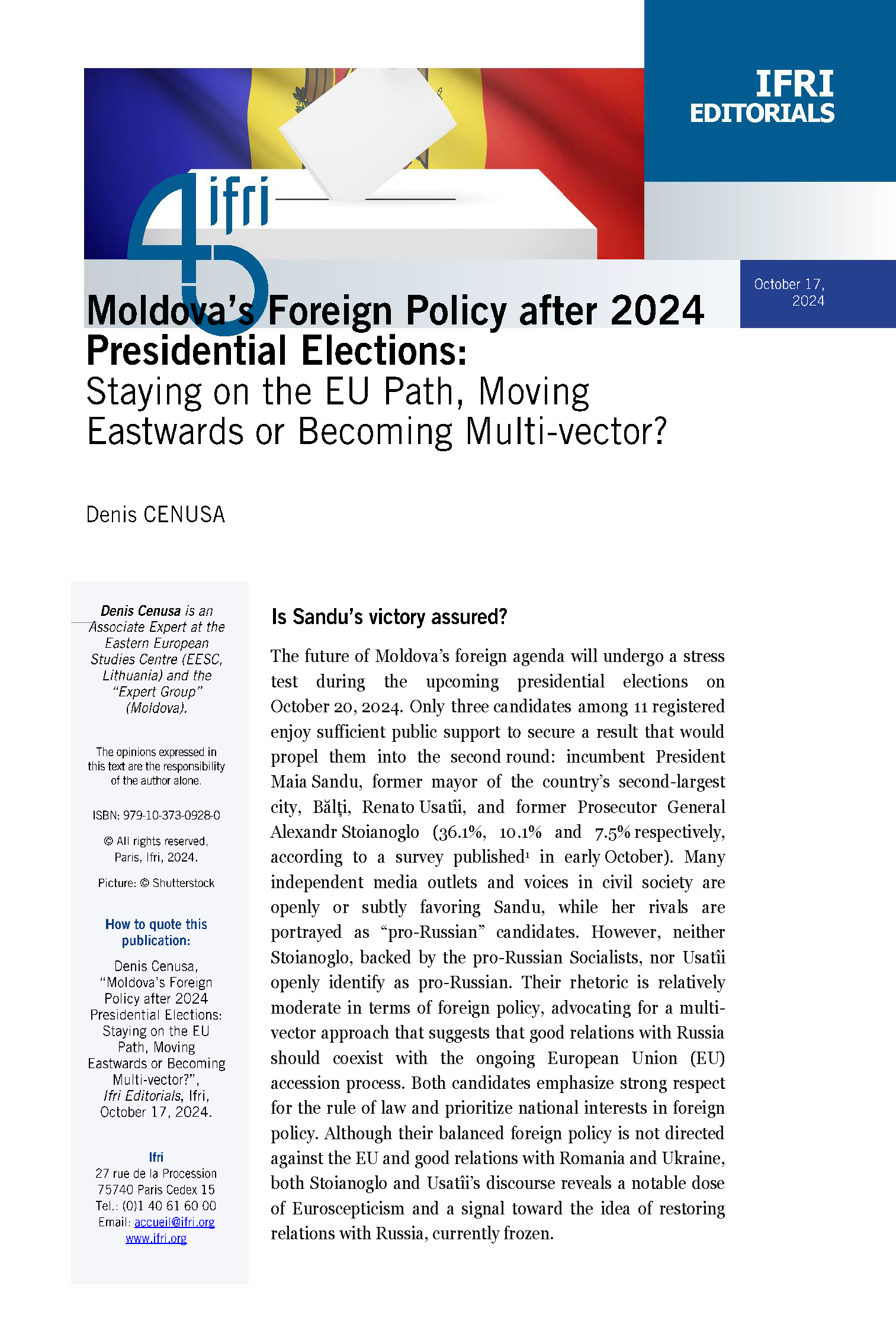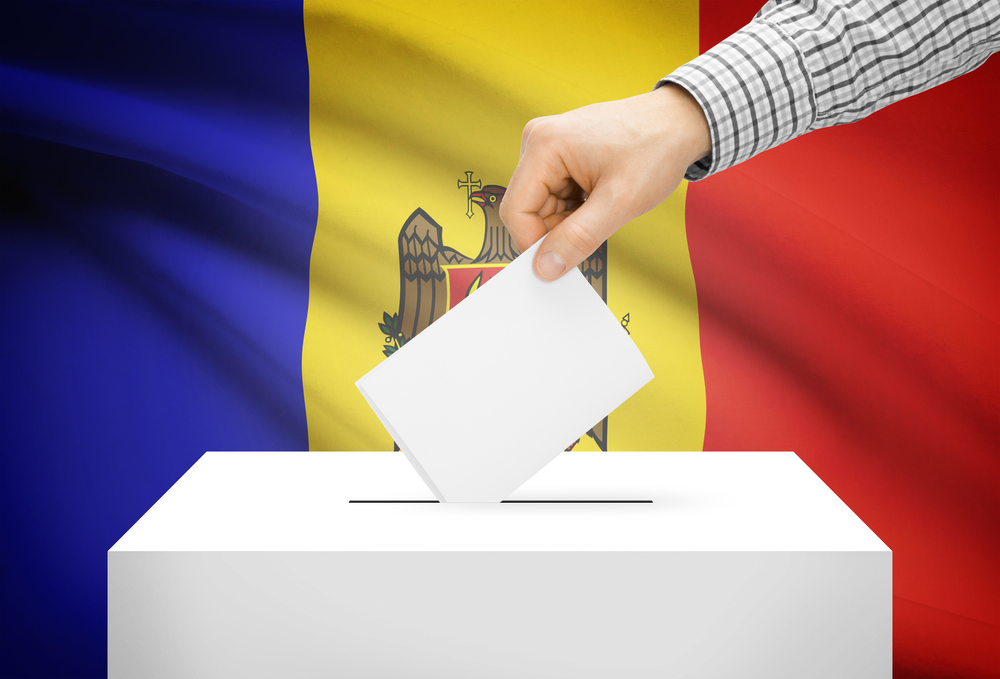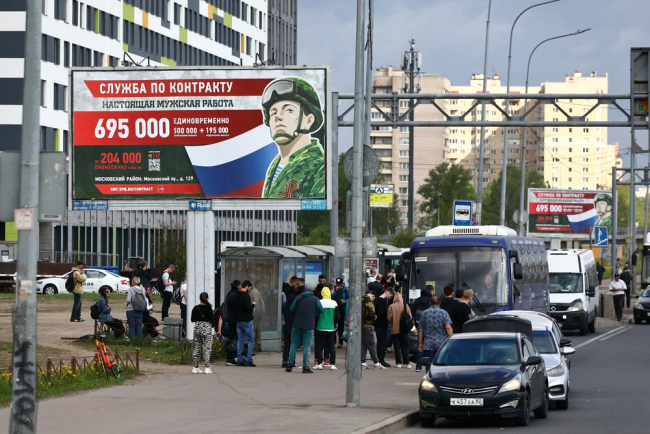Moldova’s Foreign Policy after 2024 Presidential Elections: Staying on the EU Path, Moving Eastwards or Becoming Multi-vector?

The future of Moldova’s foreign agenda will undergo a stress test during the upcoming presidential elections on October 20, 2024.

Is Sandu’s victory assured?
Only three candidates among 11 registered enjoy sufficient public support to secure a result that would propel them into the second round: incumbent President Maia Sandu, former mayor of the country’s second-largest city, Bălți, Renato Usatîi, and former Prosecutor General Alexandr Stoianoglo (36.1%, 10.1% and 7.5% respectively, according to a survey published in early October). Many independent media outlets and voices in civil society are openly or subtly favoring Sandu, while her rivals are portrayed as “pro-Russian” candidates. However, neither Stoianoglo, backed by the pro-Russian Socialists, nor Usatîi openly identify as pro-Russian. Their rhetoric is relatively moderate in terms of foreign policy, advocating for a multi-vector approach that suggests that good relations with Russia should coexist with the ongoing European Union (EU) accession process. Both candidates emphasize strong respect for the rule of law and prioritize national interests in foreign policy. Although their balanced foreign policy is not directed against the EU and good relations with Romania and Ukraine, both Stoianoglo and Usatîi’s discourse reveals a notable dose of Euroscepticism and a signal toward the idea of restoring relations with Russia, currently frozen.
Although polls suggest that Sandu could win even in the first round, the situation may shift against her in the second round due to a potential protest vote. Her main opponents have two critical “golden aces” at their disposal. First, Stoianoglo and Usatîi come from the opposition and have no experience of government at the national level; people are attracted by the novelty of their offer, which contains a large dose of populism. The second factor in their favor relates to their professional and political backgrounds, which portray them as “victims” of injustice. Stoianoglo was removed from his position as Prosecutor General under controversial accusations linking him to a businessman associated with the “Russian laundromat.” The prosecution law used to remove Stoianoglo was adopted by the ruling Action and Solidarity Party (PAS) and declared “unconstitutional” by the Constitutional Court. In October 2023, the European Court of Human Rights ruled that Stoianoglo’s right to a fair trial had been violated by the Moldovan authorities. In the case of Usatîi, his former political party, the Our Party, was eliminated because of accusations of illegal financing from the electoral race in 2014. Consequently, voters who support both candidates are often moved by a desire for political revenge. These two factors have a potential for social mobilization that seems to be underestimated by Sandu’s inner circle, who predict an easy victory for her.
Constitutional provisions and limitations on foreign policy
Moldova’s political system is parliamentary rather than presidential, making the legislature essential in setting the foreign affairs agenda. Therefore, without a political majority in the legislative body, the presidential office can become a purely symbolic exercise. This means that Moldova’s foreign orientation cannot be easily changed and never will be without parliamentary approval. In this sense, Moldova’s European integration path cannot be changed overnight if Sandu is not re-elected, since the parliamentary majority (62 deputies) belongs to PAS until 2025. Moreover, the constitutional referendum initiated at Sandu’s suggestion to ensure her an electoral advantage over the other candidates includes a declaration of the European vector as a constitutional norm. Therefore, if validated, the referendum will complicate any attempts to abandon European integration, regardless of whether Sandu’s mandate is renewed. Surveys predict a turnout of over 60%, with favorable votes ranging between 45% and 63%.
Electoral scenarios and their outcomes for Moldova’s foreign policy
The electoral scenarios can determine three different outcomes for the foreign policy of Moldova: the “continuity” of the current pro-European path; “isolation” caused by the strategic ambiguity of the future president (if it’s not Sandu) and, last but not least, a “reorientation” toward Moscow.
Scenario 1. The “continuity” of the current foreign agenda will only be ensured if Sandu is re-elected, but it can also be partly ensured if Stoianoglo or Usatîi win. None of them will be able to make radical changes until the parliamentary elections in 2025 when PAS risks losing its current monopoly on power. Although neither Stoianoglo nor Usatîi favors a radical revision of the dialogue with Brussels, they make it clear that Chișinău must condition relations with the EU to the national interest. Both candidates send characteristic signals to the “sovereigntists” of the EU member states — Hungary and Slovakia — and to those of the candidate countries — Serbia and Georgia, in this case. If Sandu is elected and if her political party (PAS) wins the parliamentary elections in 2025, continuity will involve further advancing along the EU path, prioritizing alignment with EU policies.
Scenario 2. A multi-vector approach to foreign policy that can de facto create an isolation/distancing from the EU. The scenario of Stoianoglo’s or Usatîi’s victory may produce a natural cooling of institutional relations between the Presidential Office in Chișinău and Western capitals. Currently, alarmist messages sent by PAS and some voices from civil society and the media present the non-election of Sandu as an existential risk for the European future of Moldova. During Sandu’s term, these relations were personalized, and the departure of her team could affect the dialogue with Western partners, which will require a strong push from the new president. The suspicions about the strategic orientation of other candidates can probably even provoke a pause in the EU accession process. Therefore, if Sandu is not re-elected, whoever takes office, the new president will need time to rehabilitate Moldova’s image in Euro-Atlantic capitals and get out of the “isolation” in relation to the West. At the same time, a partial and temporary “cooling” or “isolation” may result from any attempt by Usatîi or Stoianoglo to implement a form of multi-vectorism, with selective cooperation with the EU — “à la carte” and “hedging”. This would inevitably provoke mistrust and distancing attitudes on the part of the West.
Scenario 3. Reorientation of foreign policy toward Moscow would involve enormous costs. Despite the fears of the pro-European electorate, the reorientation of Moldova toward Moscow is unlikely if Stoianoglo or Usatîi win. First, because of the need for a strong parliamentary majority, which would not be the case for at least several months. However, this does not exclude the possibility of changing official narratives at the level of the President’s Office. Secondly, it is not certain that Stoianoglo or Usatîi will want to move closer to Russia until dialogue with the EU is reduced to a minimum — due to the potential isolation caused by the EU’s reaction — for at least two reasons. The first is that Moldovan foreign trade is highly dependent on the European market; in 2023, approximately 65% of exports were destined for the EU. The second reason is that any political proposal aimed at limiting fundamental rights and freedoms in relation to civil society or the LGBT community might jeopardize the visa-free regime with the EU and the status of a candidate country. This is even more likely now that the EU has observed the example of Georgia, particularly regarding Eurosceptic narratives.
The Russian hybrid tactics and European geopolitical bets
The main concern of the current Moldovan government is that the hybrid tactics employed by Russia to interfere in the electoral process could alter the outcomes of both the presidential elections and the referendum. These fears were recently corroborated by police and anti-corruption prosecutors who unveiled schemes involving electoral bribery linked to the Western-sanctioned Russian bank Sberbank, as well as the extensive use of transfers to virtual accounts held by up to 130,000 Moldovan citizens. In September alone, $15 million was funneled into illegal financing schemes targeting voters in Moldova. Behind these operations is the Shor group and its political bloc “Victory,” which operates from Moscow. The Moldovan government has achieved a positive outcome by shutting down up to 10 Telegram channels belonging to pro-Kremlin oligarch Ilan Shor and his associates, as well as accounts of propaganda outlets linked to him, including TV6 and MD24 (among others) to mitigate the risks of Russian interference. Sources linked to Shor, supported by the Russian media ecosystem, are spreading anti-EU narratives accusing the EU of controlling the Moldovan decision-making process, and claiming that EU accession threatens a loss of sovereignty, territorial integrity, neutrality and traditional values (anti-LGBT). Conversely, the same propaganda promoted integration with the Eurasian Economic Union and strategic relations with Moscow.
The ability of Russian proxies, such as Shor, to execute such schemes is rooted in the exploitation of poverty. In 2023, absolute poverty in Moldova rose to 31%, up from 24.5% in 2021, with 42% of this figure comprising the rural population, where the Shor group has effectively recruited supporters. The funds directed to vulnerable groups are intended to manipulate their votes, while payments to younger individuals are primarily aimed at involving them in orchestrated protests and provocations. Many supporters of Shor speak Russian and are likely to originate from the autonomous territorial unit of Gagauz and beyond.
Unlike Gagauzia, where the Shor-supported executive, led by Evghenia Gutul, plays a destabilizing role, Transnistria appears to be used to undermine the credibility of the referendum. The separatist region has accused Chișinău of refusing to involve its population, which includes 300,000 residents holding Moldovan identity cards. In response, the breakaway region is considering organizing its own referendum. Such a referendum would likely result in a negative vote against EU integration, since, in 2006, 97% of the region’s population supported gradual integration with Russia. If organized, a negative outcome of the referendum in Transnistria could raise significant questions about Moldova’s path toward EU membership, especially ahead of the legislative elections in 2025. It would also prompt discussions about whether this path can be pursued with or without the support of Moldovan citizens in the breakaway region. The non-involvement of the Transnistrian region in the referendum is being exploited by pro-Russian forces in Transnistria and Russia (mainly on Telegram) rather than by the electoral candidates to undermine the legitimacy of the referendum.
The EU is placing bets on Maia Sandu, given her unwavering pro-EU stance. To bolster the image of the incumbent president, who is facing challenges from Russian interference, EU stakeholders are visiting Moldova to offer Western support. A notable recent event was Ursula von der Leyen’s visit to Chișinău and her meetings with Sandu just 10 days before the elections, during which she committed to providing Moldova with a €1.8 billion financial package. However, the current electoral code, adopted by Sandu’s government, prohibits the use of images with foreign officials during the electoral campaign (Art. 70, point 4 of the Electoral Code). Sandu’s main vulnerability lies in her government’s performance, which she has consistently shielded from public criticism regarding missteps and inefficiencies related to public procurement, tenders, and countering inflation, among other issues.
While the use of administrative resources by the incumbent president and the EU’s image campaign to help Sandu could have a substantial impact on her chances of victory, the Russian factor should not be underestimated — whether through schemes to bribe impoverished voters in rural areas or orchestrated protests, likely to occur at the Moldovan embassy in Moscow, aimed at discrediting the election results. Provocations involving pro-Russian proxies and tactics are expected to intensify between the first and second rounds on October 20 and November 3, respectively.

Available in:
Themes and regions
ISBN / ISSN
Share
Download the full analysis
This page contains only a summary of our work. If you would like to have access to all the information from our research on the subject, you can download the full version in PDF format.
Moldova’s Foreign Policy after 2024 Presidential Elections: Staying on the EU Path, Moving Eastwards or Becoming Multi-vector?
Related centers and programs
Discover our other research centers and programsFind out more
Discover all our analysesWar as Social Elevator: The Socioeconomic Impact of Russian Military Keynesianism
In order to finance its war effort, the Russian state has spent substantial sums of money and implemented a form of “military Keynesianism” that is transforming society at both the socioeconomic and cultural levels. This has partially rebalanced the wide disparities in wealth, levels of consumption, and social prestige in Russian society by granting significant financial and symbolic advantages to peripheral Russia, which has long been overlooked by the central government.
The Contradictory Impacts of Western Sanctions on Economic Relations between Russia and Sub-Saharan Africa
How does Russia maintain economic ties with Africa despite Western sanctions? An analysis of investments, trade, and the circumvention strategies deployed by Moscow.
The Caspian Sea as an Emerging Energy Hub : Potentials and Limitations
This report analyzes the prospects of the Caspian Sea region — and its key actors except for Russia and Iran — becoming an important energy hub serving the needs of the European Union (EU).
The European Union's Strategic Test in Georgia
The political crisis brewing in Georgia is of an existential nature for the country. What is at stake is Georgia's future as a democratic and sovereign European nation (EU).








